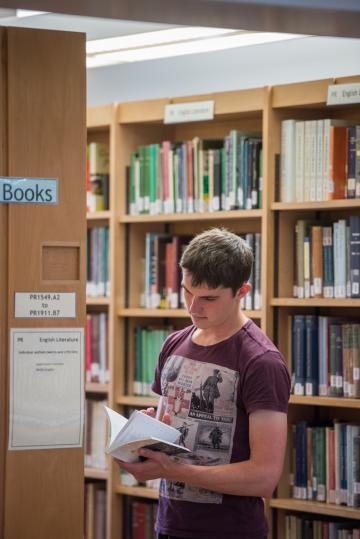Selection Criteria
Selection criteria for the degrees of Doctor of Philosophy in English; Master of Philosophy in English (Medieval); Master of Studies in English
Within equal opportunities principles and legislation, applications will be assessed in the light of a candidate’s ability to meet the following criteria:
1. Academic ability

Proven and potential academic excellence
Applicants to the MSt and MPhil programmes are expected to be predicted or to have achieved a First or a high Upper Second degree (or equivalent international qualifications) in English Literature and/or English Language, or exceptionally in a related subject. Applicants to research programmes are normally expected to be predicted or to have achieved the equivalent of the following UK qualifications: a first-class or high upper second-class undergraduate degree with honours (or equivalent international qualification) and a master’s degree with distinction. The undergraduate and master’s degrees should be in English literature and/or English language, or exceptionally in a related subject that prepares the applicant for the particular course of study they propose. For applicants with a degree from the USA, the minimum overall GPA we seek is 3.75, with at least 3.85 in the Major.
GRE and GMAT tests are not required and there is no need to have your scores sent to us.
Appropriate indicators will include:
Academic references/letters of recommendation
These should support intellectual ability, academic achievement, motivation, and (for MSt applications) ability to work in a group.
Please note that all references must be received by the application deadline, along with all other elements of the application. We therefore recommend contacting your referees well in advance of the deadline.
Written work and/or portfolio produced by the student
Applicants should submit either two essays of no more than a maximum length of 2,000 words each or one essay of up to a maximum length of 4,000 words. Academic essays or other writing samples from your most recent qualification, written in English, are required. The word count does not need to include any bibliography or brief footnotes. Extracts from longer pieces of work may be submitted, but should be prefaced by a note which puts them in context. It is preferable to submit essays related to the area and in the subject in which you wish to work. This work will be assessed for its analytical and critical acumen, the applicant's ability to construct and defend an argument, and for power of expression.
For these courses, the application form will include questions that collect information that would usually be included in a CV/résumé. You will not be asked to upload a separate document. This should be primarily focussed on academic achievement; you may also list work experience and extracurricular interests as in a regular curriculum vitae.
Research proposal or personal statement
For applicants to the DPhil, the research proposal should be an outline of your research plans (in English) of a maximum of 1,500 words. This will be assessed for the coherence and viability of the project, the originality of the project, the feasibility of its successful completion in the time available for the course (three or at most four years), evidence of understanding of appropriate research skills required for successful completion of the project, and of appropriate training at master’s level or equivalent to undertake the project.
The personal statement (for applicants to the MSt/MPhil) should be one to two pages in length. This will be assessed for evidence of motivation for and understanding of the proposed area of study and the nature of the course applied to, commitment to the subject, and evidence of a defined set of research interests. A statement which indicates the likely dissertation research area the candidate wishes to pursue is more useful than one which presents personal interests, achievements, and aspirations.
Performance at interview(s)
Interviews are not normally held as part of the admissions process.
2. Publications
We do not expect applicants to our graduate programmes to have had their work published.
3. Other qualifications and experience
Evidence of training in research techniques may be an advantage.
4. Availability of DPhil supervision, teaching, facilities and places

The following factors will govern whether candidates can be offered places:
- The ability of the Faculty of English to provide the appropriate supervision, research opportunities, teaching and facilities for the applicant's chosen area of work.
- Minimum and maximum limits to the numbers of students who may be admitted to Oxford's research and taught programmes.
The provision of supervision, where required, is subject to the following points:
- The allocation of graduate supervision is the responsibility of the Faculty of English and it is not always possible to accommodate the preferences of incoming graduate students to work with a particular member of staff.
- Under exceptional circumstances a supervisor may be found outside the Faculty of English.
Where possible, the student's academic supervisor will not change for the duration of the course; however, it may be necessary to assign a new academic supervisor during the course of study or before registration for reasons which might include sabbatical leave, maternity leave or change in employment.
5. English language requirement
Applicants whose first language is not English are usually required to provide evidence of proficiency in English, at the higher level required by the University. Further information.
6. Deadlines and required full set of application materials
Please refer to the Graduate Admissions website for information on the deadlines which must be met, and the full set of supporting materials required, in order for applications to be guaranteed consideration.
7. Funding
Whether you have yet secured funding is not taken into consideration in the decision to make an initial offer of a place. Please note, however, that the initial offer of a place will not be confirmed until the college which makes the offer is satisfied that you have sufficient funding to cover your fees and living costs, for the standard period of fee liability for your course.
8. Disability, health conditions and specific learning difficulties
Students are selected for admission without regard to gender, marital or civil partnership status, disability, race, nationality, ethnic origin, religion or belief, sexual orientation, age or social background. Decisions on admission are based solely on the individual academic merits of each candidate and the application of the selection criteria appropriate to the programme of study.
9. Contacting academic members of staff
Masters: It is not necessary to make contact with an academic member of staff prior to submitting an application.
DPhil: It is not necessary to find a supervisor before submitting an application. However, it may be worth looking up faculty members' research and teaching interests to check that a suitable supervisor is available. Supervisors are allocated by the graduate admissions committee, and a faculty member's willingness to supervise is no guarantee of admission.
Please bear in mind point 4 regarding availability of supervision.
10. Assessors
All recommendations to admit a student involve the judgement of at least two academic staff with relevant experience and expertise.
In all cases, the Director of Graduate Studies or the Admissions Committee will give approval to a decision.
Admissions panels or committees will always include at least one member of academic staff who has undertaken appropriate training.
11. Other information
It would be expected that graduate applicants would be familiar with the recent published work of any supervisor they propose.
In the case of students who require specific help to adjust to an academic programme or who need to acquire new skills, the supervisor will work with them to ensure that they have additional support.



